Early in 2023 I got an invitation to a wedding anniversary party for a friend who lives near Augusta, Georgia. That's a city I thought was worth a look, so I took a few days off from work for a trip there.
Founded in 1736 and named for the mother of George III, Augusta is the second-oldest city in Georgia. It is located on the Savannah River, upriver from the city of Savannah, which had been founded only three years before this city. Today, Augusta is mostly known for being the home of the Masters golf tournament every April.
Thursday, May 4, 2023
Augusta is a rather out-of-the-way destination and there aren't many direct flights into its airport. The best-timed and most economical way in, for me, was on Delta from Albuquerque to Atlanta and then Atlanta to Augusta. But, I didn't want to do this, because flying such a short distance from Atlanta to Augusta seemed inefficient. However, the only bus connections between those two cities weren't at convenient times, and I didn't have enough reward points to cover an American Eagle trip with a layover in DFW or Charlotte.
I didn't have enough points to cover the Delta flights, either, but I did have enough for a special deal in which I'd only pay 60,000 points plus $180. So Thursday morning I was doing the long road trip to from Clovis to Albuquerque. The two flights were pretty uneventful, and I landed at 6:56pm. For me, still on Mountain Time, that still felt like 4:56.
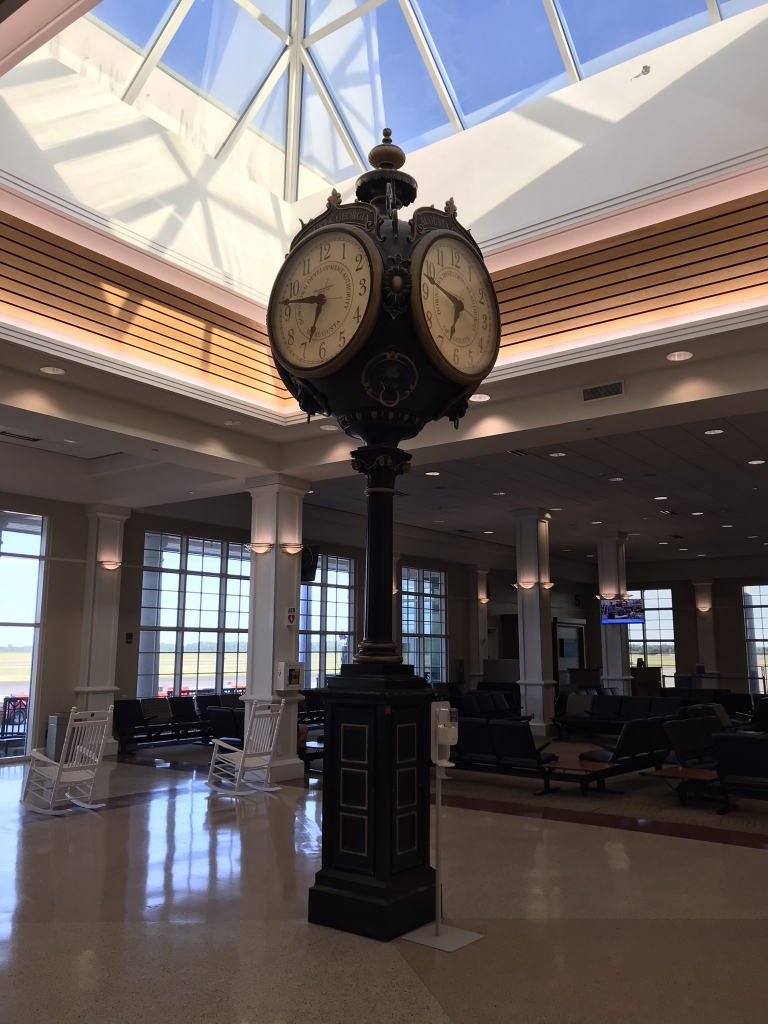
In the passenger waiting area in Augusta's airport. This is the clock that used to stand in the train station, which has long since been torn down. You know if there were still trains serving Augusta, I would have arrived on one.
Next I needed to claim the rental car I'd reserved, which was the only way out of the airport. This is the only airport I've ever been to which had no public transit connections. But I would need to rent a car no matter what, since I needed it to get to Blythe, where Friday's gathering would be. I stood in the slow-moving line for I don't know how long, and when I finally got to the desk, I found out they didn't have any more compact cars like I'd reserved, only SUVs. Sure, I would only be getting charged for a compact, but I would still have to drive an oversized SUV with poor visibility.
This same thing happened to me almost two months earlier on a work trip to Fort Walton Beach, Florida. I'd reserved a compact, the same size vehicle that I drive at home, and all they had was SUVs. It seems this is what everyone in this country wants to drive now; I overheard someone at one of these rental agencies say they're not even buying compact cars for their fleet anymore. Anytime I drive one, it just feels like it's taking up too much space, and whenever I look in the rear view mirror I can hardly see anything through the back window.
After driving out of the airport in my reluctantly-rented SUV, I got dinner from a Firehouse Subs, and then headed to my hotel, a Rodeway Inn on Washington Rd near I-20. Like most other Rodeways I've stayed in, it could be best described as "adequate." There were lamps on the nightstands which weren't even plugged in, because there were no outlets to plug them into.
Friday, May 5, 2023
Staying at a Rodeway, I was going to have to find breakfast outside the hotel. From a BP station down the street from the hotel I got some surprisingly good gas station coffee, and then I ran across the street to a Starbucks for a sausage, egg, and cheddar biscuit.
I may have had a rental car, but I was determined to still use the sparse, barely-adequate bus system as much as I could. My hotel was right next to a bus stop where I could board bus 5 in the direction of the city center. This bus took a rather meandering path to get to the eastern end of its route at the transfer station, where I took one of the other routes down Broad street into downtown Augusta.
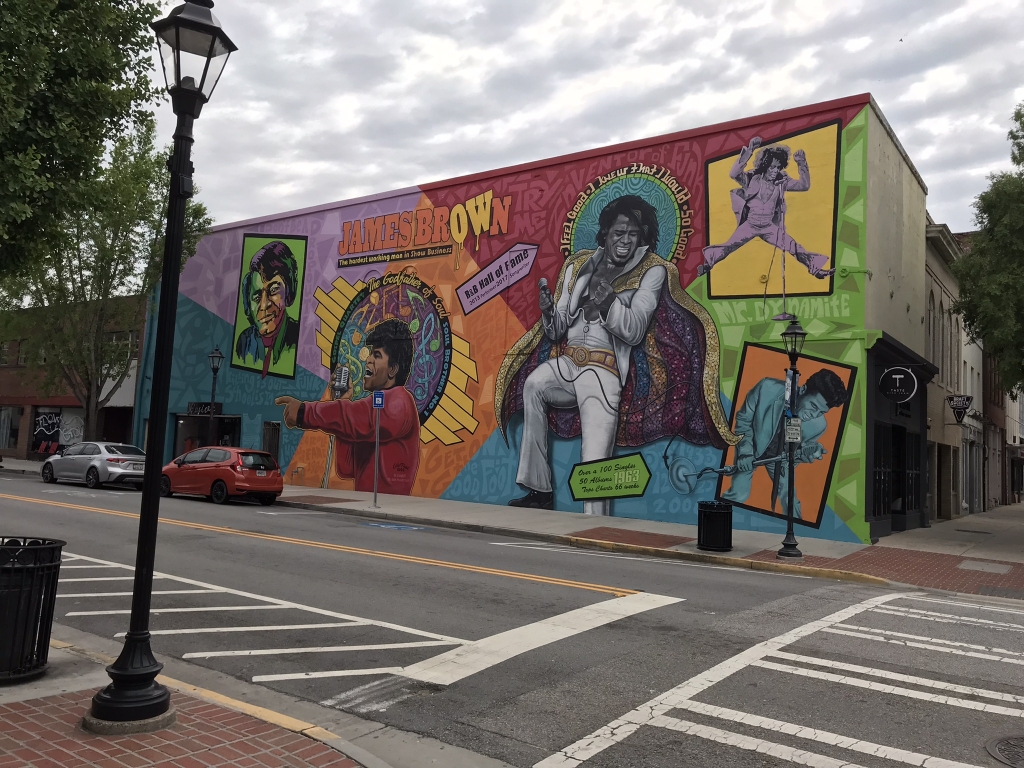
My first stop was for another coffee. Metro Pub and Coffeehouse was a great place for that. Not only a great place for coffee, but beer as well! But we'll get to the beer later, at this point it felt too early for that. I just had a dark roast coffee.
Augusta has a rather scenic riverwalk along the Savannah River.
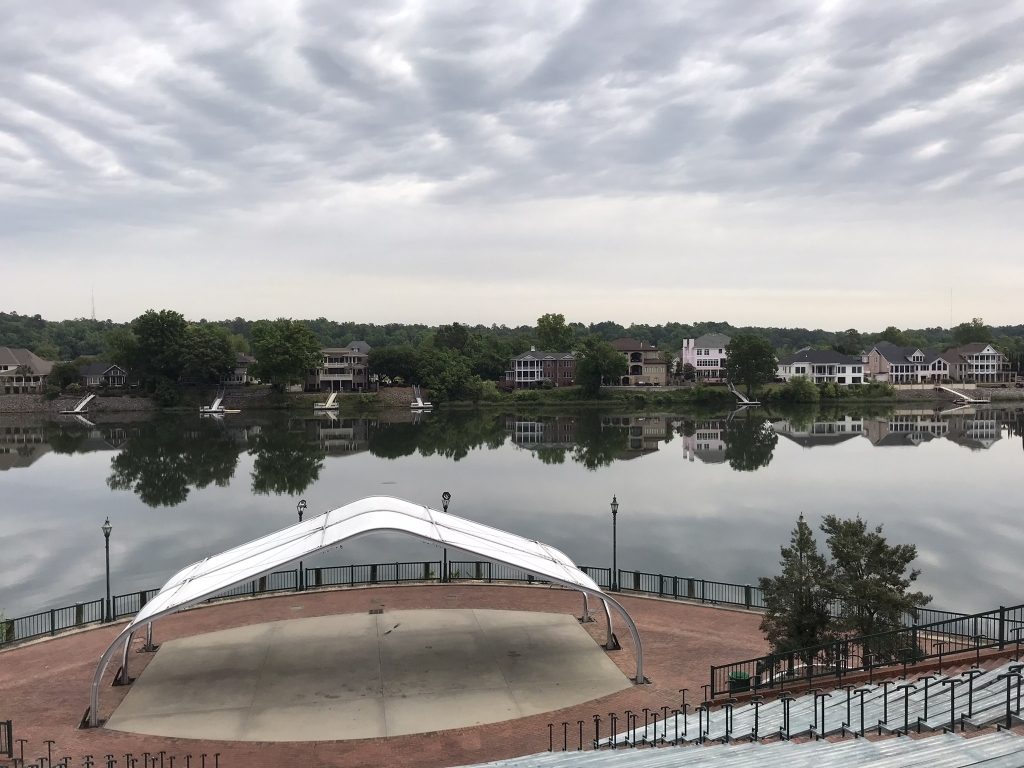
The Savannah River separates Georgia from South Carolina; those lovely houses across the river are in North Augusta, South Carolina. I wonder what kind of shows they put on at this theater?
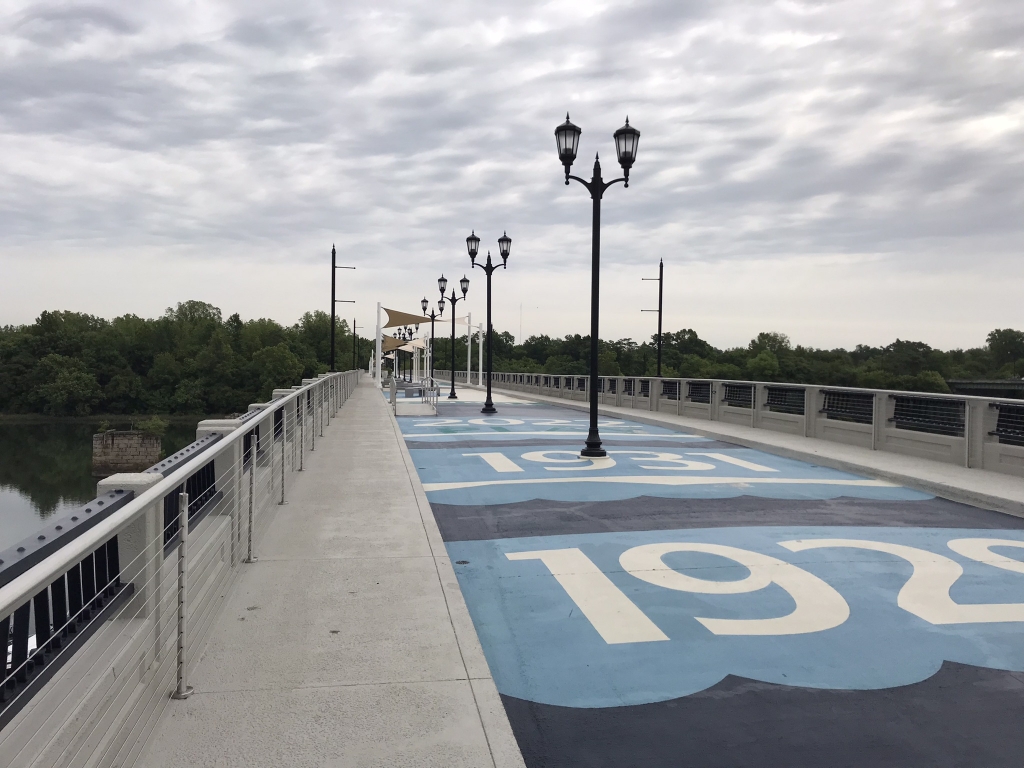
From the riverwalk you can get to this pedestrian bridge, the Freedom Bridge. There's a lot of things on this bridge like musical instruments such as a xylophone that you can stop and attempt to play a tune on, and sculptures you can look at.
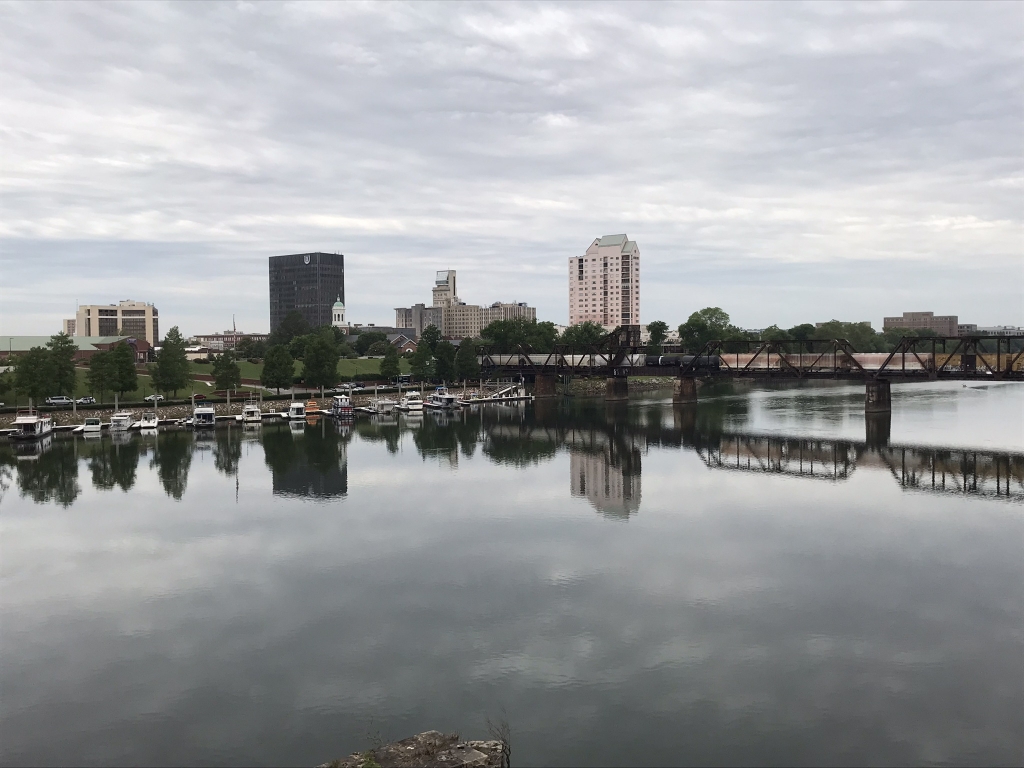
After I reached the end of the bridge, on the South Carolina side of the river, I turned around and walked back. Here's a view of Augusta as seen from the bridge.
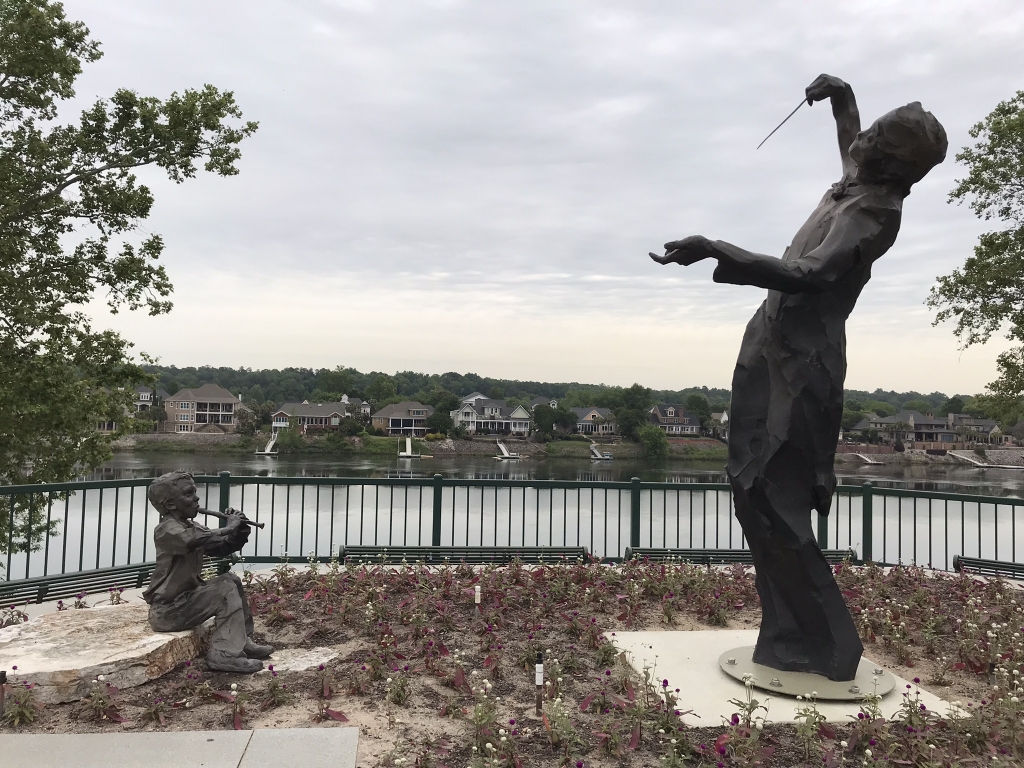
Back on the Augusta riverwalk, here's some more sculptures.
Leaving the Riverwalk, I soon found a green space called New Augusta Common. When the city was first planned out in 1736, it consisted of several rectangular lots of varying sizes, divided by a street grid, surrounding a huge park called Augusta Common. However, the original Augusta Common took up 600 acres and is now covered by buildings and streets, while the New Augusta Common occupies one of the long, narrow lots adjoining where the original used to be, and is only about 1/12 the size.
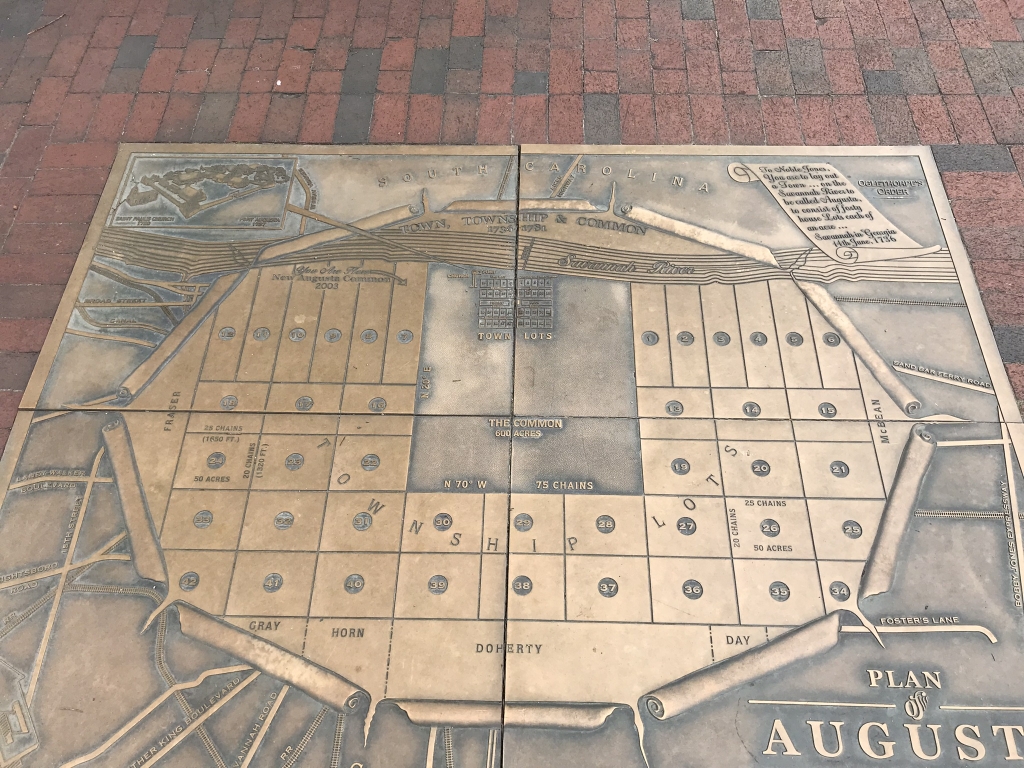
This is how Augusta was originally planned out. You can see where the original Common was, and where the current one is adjoining it to the left.
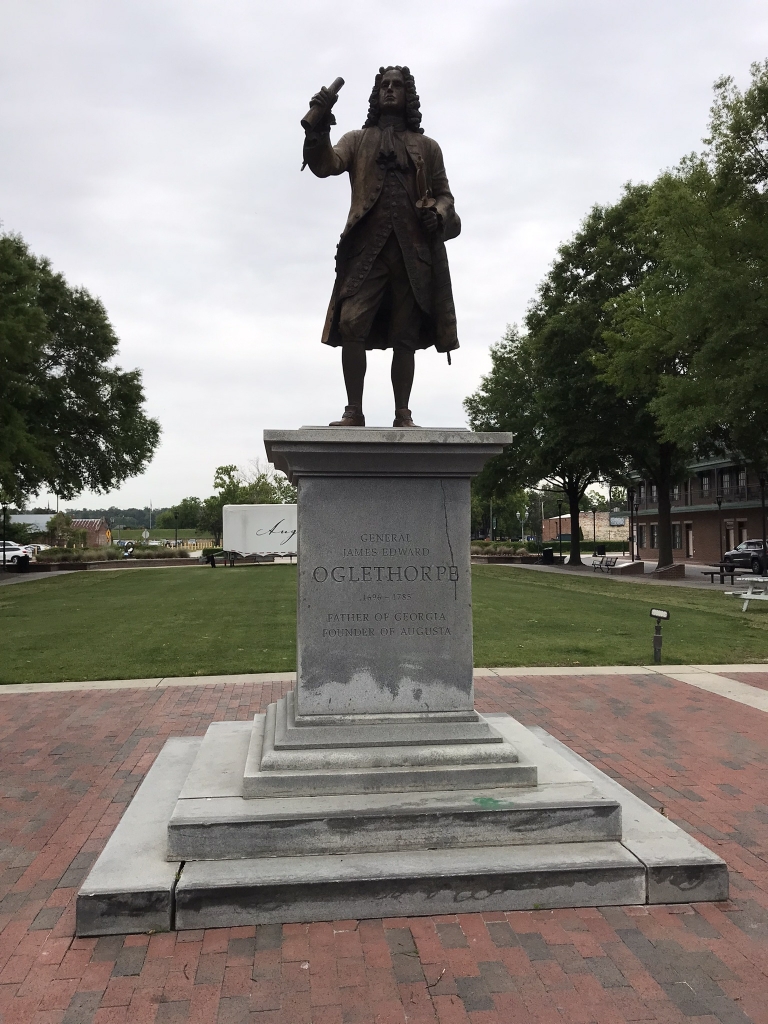
Statue of James Oglethorpe, the founder of Georgia, on the New Augusta Common.
When I made it back to Broad Street, it was about time for lunch. There are plenty of good restaurants in the middle of Augusta, and I settled one one that wasn't exactly serving local cuisine, Laziza Mediterranean Grill. I had a Laziza bowl (basmati rice, lettuce, tomato, onion, cucumber) with salmon. I liked it, although it's not something you'd seek out if you're looking for Deep South food.
Moving back into the city...
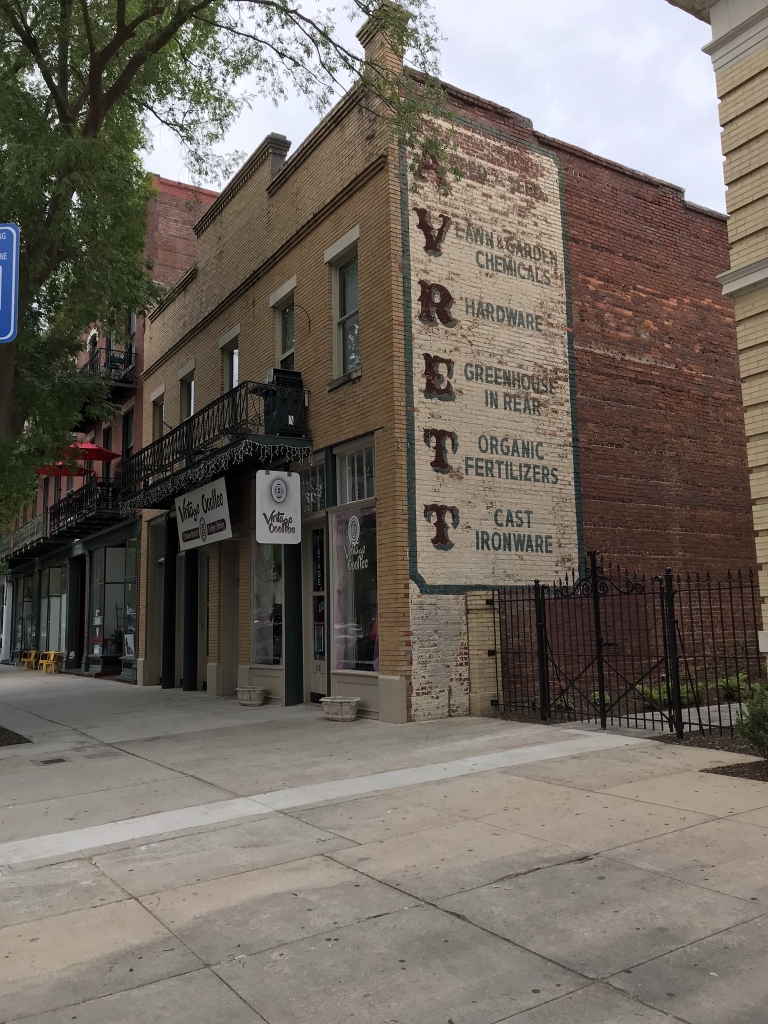
I've always got to take pictures of these "ghost signs." I wonder how long ago Avrett went out of business. This was a vintage clothing store when I was there, so you're not going to find any greenhouse in the rear anymore. Also...a look at Google Maps today reveals that the vintage clothing store has itself gone out of business, so who knows what will move into this building next.
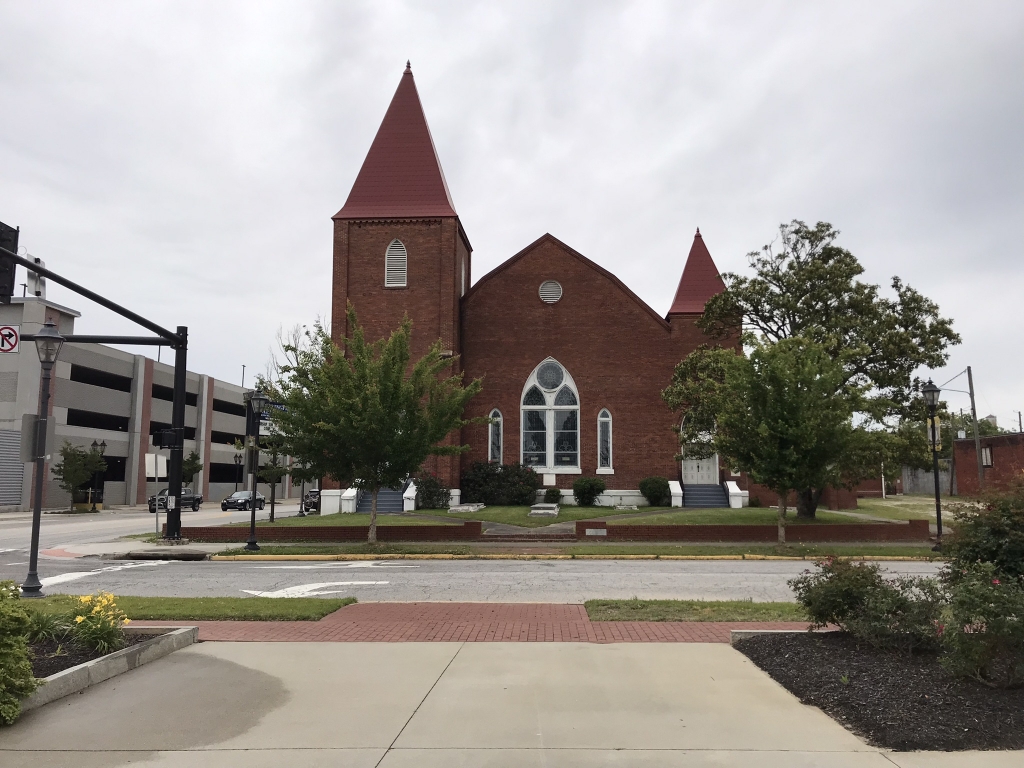
Springfield Baptist Church, built around 1801, is one of America's oldest Black churches.
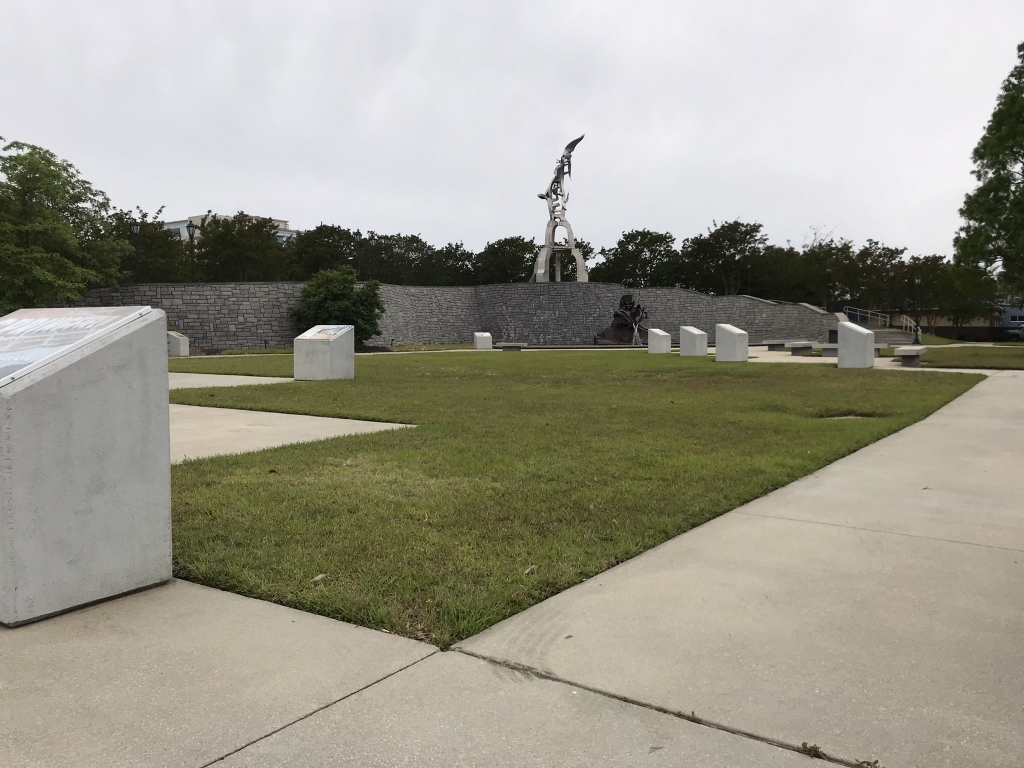
The Tower of Aspirations, across 12th Street from Springfield Baptist Church.
Without any more downtown plans, I soon found myself on the River Levee Trail, a long walk/bike path running alongside the river west of downtown Augusta. This was a nice scenic walk surrounded by green trees. That may not seem very interesting to most people, but living in eastern New Mexico I don't see so many trees in one place very often.
It was getting late and I had a party to get to eventually, so I exited the trail at Aqueduct Park, next to Lake Olmstead. After walking past the lake and several houses, I got to Broad St. where Bus 5 took me back to my hotel.
Saturday, May 6, 2023
The previous day had been just some downtown meandering and walking on trails. Today I'd finally see some things that were a little more interesting.
First, though, I wanted to swim some laps, so I drove to the Augusta Aquatic Center for that. Their pool was 50 meters long, but somehow it felt even longer.
By the time I stepped off the bus downtown, it was about time for lunch. My restaurant choice was the Pineapple Ink Tavern, where I got a La Casa salad with chicken, and...
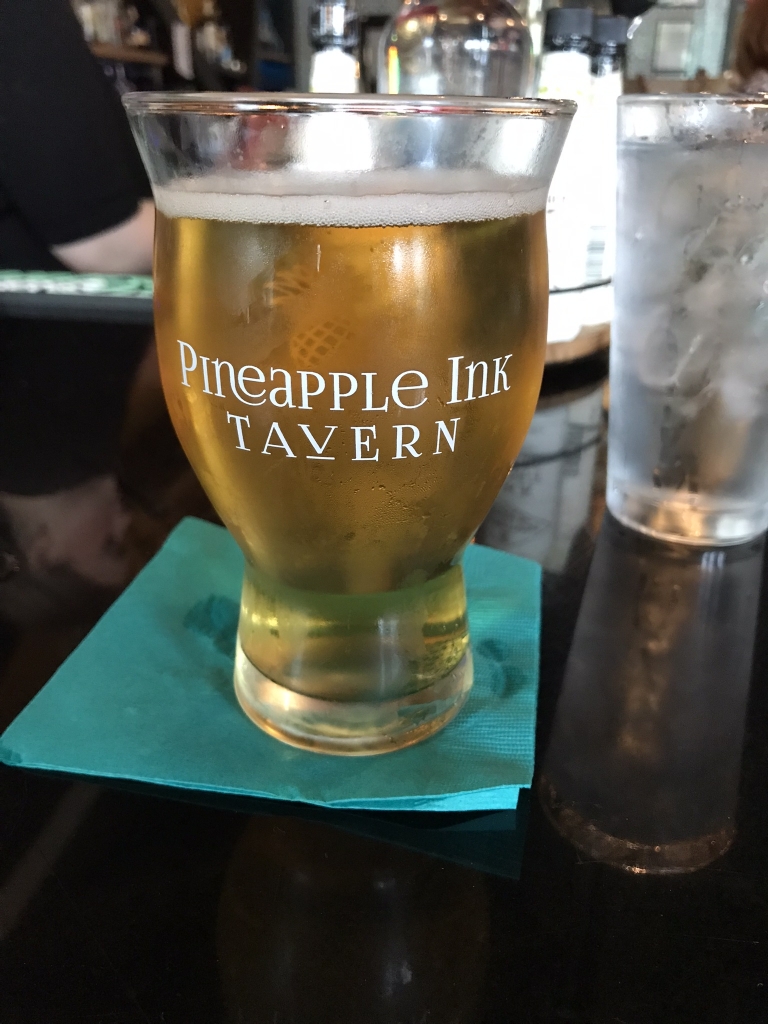
No Jacket Required Pilsner, made by Augusta's own Savannah River Brewing Company.
Outside, back on Broad St., I discovered that an annual local event was going on, and I always want to check these things out when I'm visiting a city. What was going on was the Augusta Handmade Fair, where local vendors sell all kinds of goods they make themselves, like pottery, clothing, and art. Interesting to look at, but I didn't see anything I wanted to take home.
But I did find some things to spend money on just next door to the fair, at the New Moon Café. Not only did I get myself a cup of Tanzania Peaberry coffee, but I also got myself some Charleston tea and a bag of Kickersnoodle coffee grounds. That name "Kickersnoodle" was rather eye-catching which is why I had to ask about it and then buy some; it's flavored to taste like Snickerdoodle cookies
My next stop was a historic site, the boyhood home of President Woodrow Wilson, at the corner of Telfair and 7th.
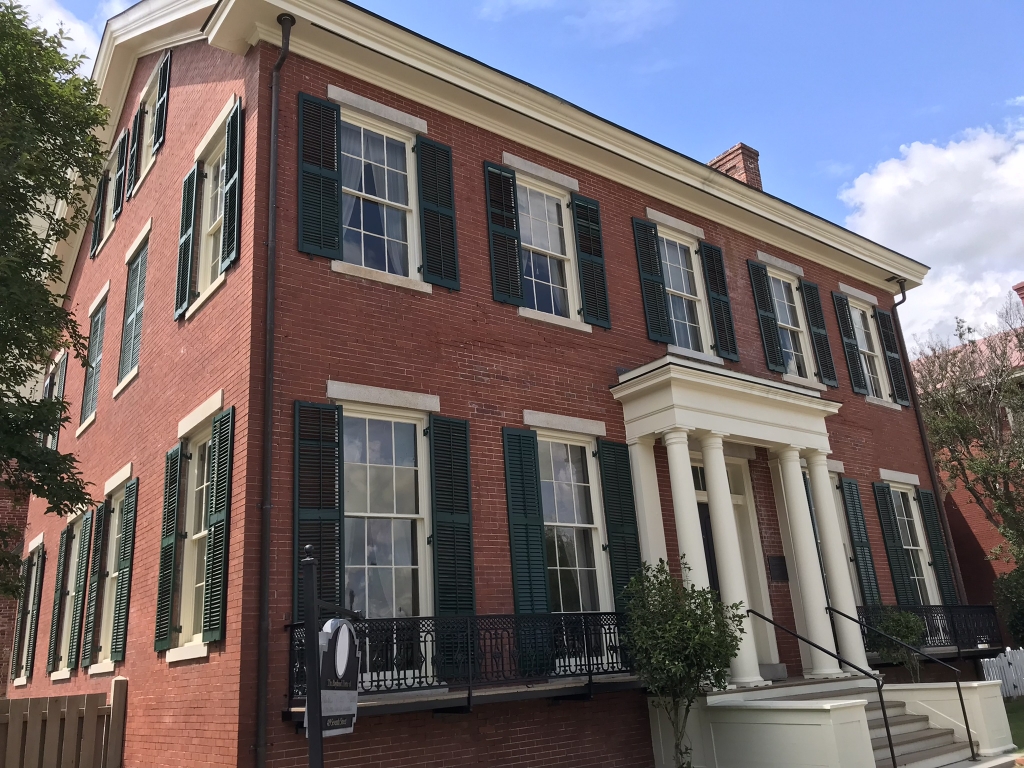
Woodrow Wilson was president for two terms, from 1913 to 1921. He's mostly remembered now for establishing the Federal Reserve, and for presiding over the United States' fighting in the First World War, at the end of which he laid down a plan for peace known as the Fourteen Points.
In the house, before or after the guided tour, you can look at some displays, old photos, and walls of text where you can learn a bit about Wilson's life and presidency. He was a progressive, which back then meant almost the same thing as it does now, but also back then could be found in both political parties--Wilson was a Democrat, but there were Republican progressives as well--as the parties were not as ideologically sorted as they are now. As one of the signs says about Wilson, "His efforts generally favored workers, immigrants, and children and often went against big business.
The Federal Reserve--the U.S.'s national bank--and the Federal Trade Commission were both stood up during his first term. When it came to women's suffrage, a hot-button issue of that time, Wilson at first supported it but believed it should be left to the state governments, and only in 1918 came around and lobbied for the passage of the 19th Amendment to the U.S. Constitution. On the negative side, he was actually rather regressive on race relations; he allowed his cabinet members to segregate their agencies, and during his second term imposed segregation on the military when the U.S. entered WWI. Black voters supported him during his first campaign, but turned on him during his reelection campaign because he had been such a disappointment.
The tour through the house is guided and you can't take photos. As you walk through this house, which is preserved the way it was during the 1860s, you learn quite a lot about the former president's upbringing. His full name was Thomas Woodrow Wilson, with his middle name being his mother's maiden name; he was known as "Tommy Wilson" growing up, and only began using his middle name as a first name when he entered politics. He wasn't actually born in Augusta, but in Staunton, Virginia, and the family only moved to Augusta while he was only a year old. He lived here until he was 14, when the family moved again to Columbia, South Carolina.
In one room, you can see "Tom" carved into a window in a child's loopy handwriting. The guide speculated that a very young Tommy Wilson had been trying to carve his name but that his father caught him before he could finish.
Wilson's father was a Presbyterian minister, and the tour of the house goes through his study. His old Bible, from which he read to his family, is there on the desk. Joseph Wilson was the minister of Augusta's First Presbyterian Church. The house is close enough to the church that you can see the church from some of the windows; the church is on the opposite corner of Telfair and 7th from the house, and is still an active Presbyterian church.
The Civil War broke out while the Wilsons lived here, and Woodrow's earliest memory was hearing that Abraham Lincoln had been elected president and war was on the horizon. Joseph was a staunch Confederate supporter, and was even one of the founders of the Presbyterian Church of the United States, a southern Presbyterian denomination that split off from the northern church when the Civil War started. Growing up in this environment is certainly what informed Woodrow's beliefs about race.
After the tour I walked through the room with the displays and found one more interesting thing.
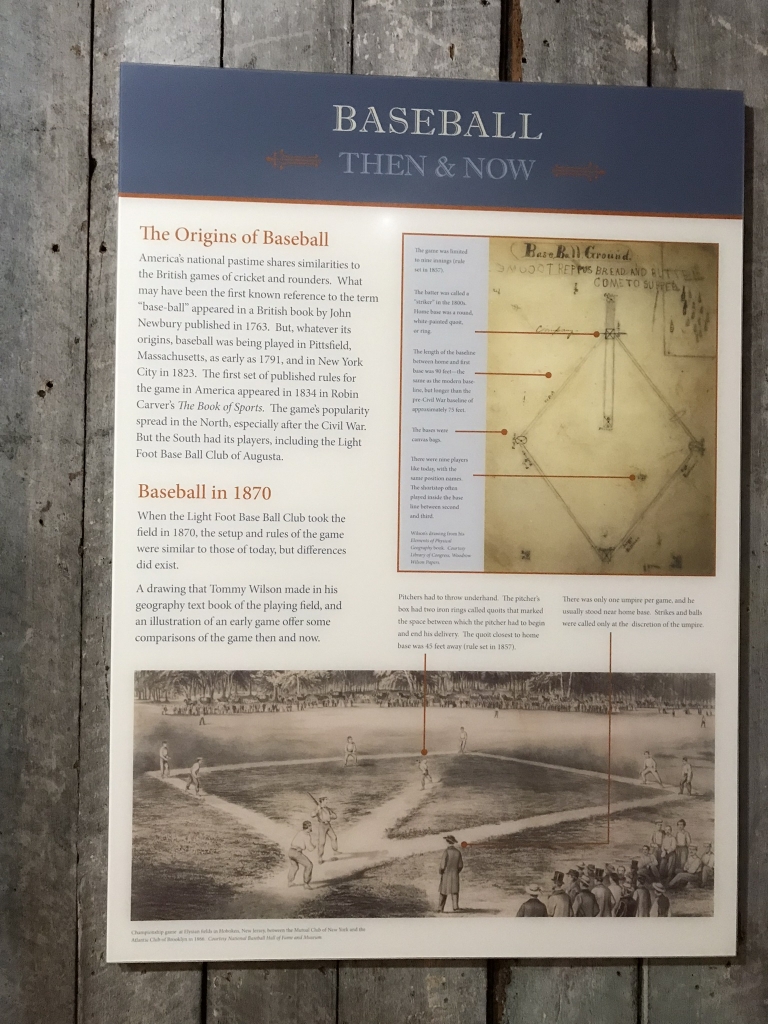
Tommy Wilson had sketched these notes, seen on the top half of this sign, on a blank page in his geography textbook, on the layout of a baseball field and where the players were positioned, showing how the game was played back in the 1860s.
After leaving the Woodrow Wilson home, back on Broad St., I wanted to find some more craft beer. The Draft Society Taproom is a must-visit for any beer snobs. This is a place where they give you a glass when you enter, and then you can serve yourself from the long row of beer taps on the wall. I've only been to one other place like this, the Pour Taproom in Charleston. Here at Draft Society I had two beers. First was a Golden Monkey Belgian Tripel made by Victory Brewing in Downingtown, PA, followed by something more local, an SMF Lager made by Southbound Brewing in Savannah.
I had one more downtown place I wanted to visit, Metro Pub and Coffeehouse. The day before, I'd visited for the coffee, and now I was going back for the "pub" aspect. Only for one drink, though, a Savannah River Dynamite Brown ale.
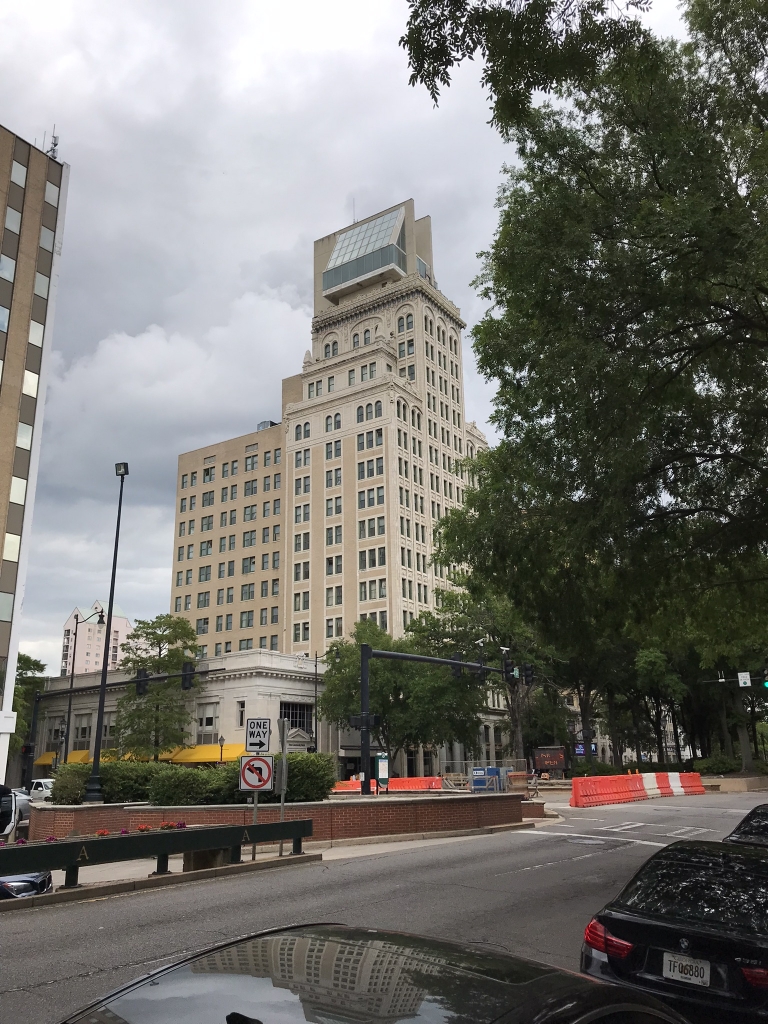
I happened to get this good view of the Lamar Building. It was built in 1918 but that incongruous penthouse dates from 1976 and was designed by the famed architect I.M. Pei.
A series of two buses took me back to my hotel from Broad. From there, I walked up the road to a great seafood restaurant, Rhinehart's Oyster Bar. I'll recommend this place too! Great place for southern-style seafood, and I had a delicious bowl of jambalaya. Somewhat fitting that my last meal on this trip would be jambalaya, because my next trip would be to New Orleans.
I finished off the night drinking a couple of shots and listening to a cover band at Doc's Porchside, between Rhinehart's and the Rodeway.
Sunday, May 7, 2023
With a super-early flight to catch--7 a.m. meaning I needed to be at the airport much earlier--I had to drag myself out of bed and check out of the hotel before dawn, drive to the airport, and turn in my rental SUV.
Overall I liked Augusta. I didn't love it but I liked it. It's got a lot of history and I liked that they kept the historic city center preserved instead of replaced with parking lots and office blocks. Still, it's no Savannah. Augusta doesn't blend housing with shops and restaurants nearly as much as Savannah does, and there are no Amtrak connections to nearby cities. Also, the public transit is rubbish; the bus network is barely adequate, doesn't even service the airport, and doesn't run on Sundays! I did enjoy my weekend there, but I think I've probably seen nearly everything there is to see there.

